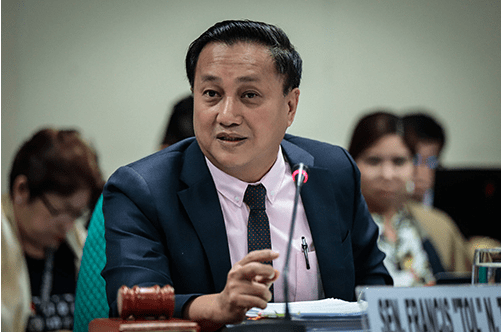
Sen. Francis Tolentino speaks during a hearing on waste-to-energy facilities on Jan. 28, 2020 at the Senate. (Henzberg Austria/Senate PRIB)
Sen. Francis Tolentino realized he made the wrong move at the wrong time in announcing he was tested for the novel coronavirus.
“Salamat sa Diyos. Negative po ako sa Coronavirus. Dalangin ko rin po ang kaligtasan ng bawat Pilipino,” read the caption of his Facebook photo showing him smiling next a medical technician.
Within moments, his social media account was swarmed with comments from netizens assailing him for availing himself of one of the test kits that are so scarce even for those with more serious symptoms for the deadly disease.
His colleagues at the Senate posted the same update days before he did, but they did not receive the same backlash. Unfortunately for Tolentino, he displayed his test result as negative when the online public was already fed up with reports of officials and their families who, despite not having symptoms, skipped the long queue and skirted the Department of Health’s criteria for testing.
Tolentino had his Facebook post deleted, but not before news organizations captured and reported it. Twitter users also managed to take screenshots of the post.
He—or his communications staff—then blocked social media users who denounced the testing.
You can block us all you want @phSenTol but it won’t stop us from criticizing rotten public servants like you. https://t.co/oFkzWnBkUg pic.twitter.com/xMCy3TBrJf — sibey???????????? (@crimson_styx) March 23, 2020
A source said the image-conscious Tolentino also pulled strings only close and well-connected allies of President Duterte had access to. He complained to the owners of newspaper The Philippine Star, whose online counterpart Philstar.com, carried the story about his testing on the same day.
The report pointed out that the senator was asymptomatic and would not be eligible for testing if DOH guidelines were to be followed. Tolentino wanted it taken down and he had his way that afternoon of Sunday, March 22.
It was the latest example of media owners giving in to concessions with top administration officials in exchange for the security of their businesses. The Duterte administration’s threats and attacks on Rappler and ABS-CBN and roughing up large private companies in various sectors have spooked businessmen and investors since 2016. As a result, editors and reporters, who generally have no ownership entitlements to the organizations they serve, could be muzzled and their reports and pitches killed.
The Center for Media Freedom and Responsibility and the Philippine Center for Investigative Journalism’s press freedom monitor showing a relatively low tally of article takedown incidents belie a much darker reality—that Duterte’s allies are able to have a say on how they appear in the news.
Commenting to a similar request by Sen. Vicente Sotto III to take down an Inquirer.net article in 2018, media watchdog CMFR wrote that such takedowns are only justified if the ethical or legal violations of the content are made clear, otherwise the request becomes a demand, a contempt for the Constitution’s protection for the press.
“No matter how politely phrased, a ‘request’ from the powerful to withhold publication, delete, modify or to take down an article is just another name for a demand that the news media abdicate that duty,” CMFR said in a statement.
Tolentino did not seem to have identified what was amiss in the report he asked to be unpublished. He himself later admitted what was reported when he apologized for having taken the Covid-19 test.
“My apologies to those offended,” Tolentino said in a statement.
However, the senator still tried to defend his move, saying he had persistent “colds and dry cough” that were not relieved by his medication for four days. He was also exposed to an infected person, he said, and his “negative result was not a DOH test.”
Colds and dry cough, along with fever and tiredness, are some of the symptoms of COVID-19. But Tolentino was asymptomatic when he took the test, according to reports quoting Senate President Tito Sotto on March 17. (PressONE.ph)